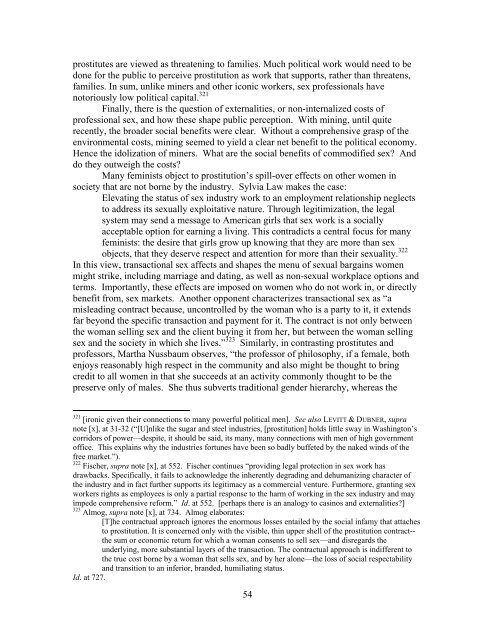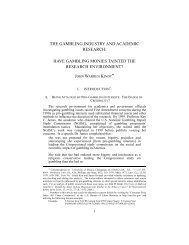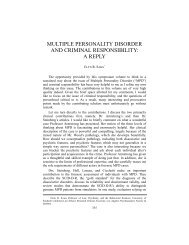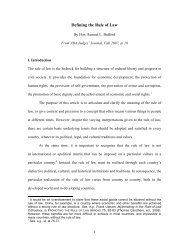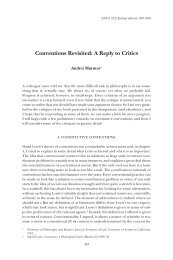1 Regulating Sex Work Adrienne D. Davis VERY ROUGH DRAFT ...
1 Regulating Sex Work Adrienne D. Davis VERY ROUGH DRAFT ...
1 Regulating Sex Work Adrienne D. Davis VERY ROUGH DRAFT ...
Create successful ePaper yourself
Turn your PDF publications into a flip-book with our unique Google optimized e-Paper software.
prostitutes are viewed as threatening to families. Much political work would need to be<br />
done for the public to perceive prostitution as work that supports, rather than threatens,<br />
families. In sum, unlike miners and other iconic workers, sex professionals have<br />
notoriously low political capital. 321<br />
Finally, there is the question of externalities, or non-internalized costs of<br />
professional sex, and how these shape public perception. With mining, until quite<br />
recently, the broader social benefits were clear. Without a comprehensive grasp of the<br />
environmental costs, mining seemed to yield a clear net benefit to the political economy.<br />
Hence the idolization of miners. What are the social benefits of commodified sex? And<br />
do they outweigh the costs?<br />
Many feminists object to prostitution’s spill-over effects on other women in<br />
society that are not borne by the industry. Sylvia Law makes the case:<br />
Elevating the status of sex industry work to an employment relationship neglects<br />
to address its sexually exploitative nature. Through legitimization, the legal<br />
system may send a message to American girls that sex work is a socially<br />
acceptable option for earning a living. This contradicts a central focus for many<br />
feminists: the desire that girls grow up knowing that they are more than sex<br />
objects, that they deserve respect and attention for more than their sexuality. 322<br />
In this view, transactional sex affects and shapes the menu of sexual bargains women<br />
might strike, including marriage and dating, as well as non-sexual workplace options and<br />
terms. Importantly, these effects are imposed on women who do not work in, or directly<br />
benefit from, sex markets. Another opponent characterizes transactional sex as “a<br />
misleading contract because, uncontrolled by the woman who is a party to it, it extends<br />
far beyond the specific transaction and payment for it. The contract is not only between<br />
the woman selling sex and the client buying it from her, but between the woman selling<br />
sex and the society in which she lives.” 323 Similarly, in contrasting prostitutes and<br />
professors, Martha Nussbaum observes, “the professor of philosophy, if a female, both<br />
enjoys reasonably high respect in the community and also might be thought to bring<br />
credit to all women in that she succeeds at an activity commonly thought to be the<br />
preserve only of males. She thus subverts traditional gender hierarchy, whereas the<br />
321 [ironic given their connections to many powerful political men]. See also LEVITT & DUBNER, supra<br />
note [x], at 31-32 (“[U]nlike the sugar and steel industries, [prostitution] holds little sway in Washington’s<br />
corridors of power—despite, it should be said, its many, many connections with men of high government<br />
office. This explains why the industries fortunes have been so badly buffeted by the naked winds of the<br />
free market.”).<br />
322 Fischer, supra note [x], at 552. Fischer continues “providing legal protection in sex work has<br />
drawbacks. Specifically, it fails to acknowledge the inherently degrading and dehumanizing character of<br />
the industry and in fact further supports its legitimacy as a commercial venture. Furthermore, granting sex<br />
workers rights as employees is only a partial response to the harm of working in the sex industry and may<br />
impede comprehensive reform.” Id. at 552. [perhaps there is an analogy to casinos and externalities?]<br />
323 Almog, supra note [x], at 734. Almog elaborates:<br />
[T]he contractual approach ignores the enormous losses entailed by the social infamy that attaches<br />
to prostitution. It is concerned only with the visible, thin upper shell of the prostitution contract-the<br />
sum or economic return for which a woman consents to sell sex—and disregards the<br />
underlying, more substantial layers of the transaction. The contractual approach is indifferent to<br />
the true cost borne by a woman that sells sex, and by her alone—the loss of social respectability<br />
and transition to an inferior, branded, humiliating status.<br />
Id. at 727.<br />
54


